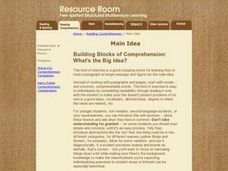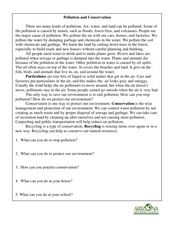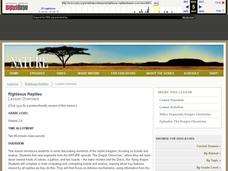Curated OER
Building Blocks Of Comprehension: What Is The Big Idea?
Students engage in a lesson that is about finding the main idea of a passage of reading. They use a passage while focusing upon the words and defining vocabulary. The students work on fluency and then identify the main idea.
Curated OER
Houses Around the World
In this cultural worksheet, students read a passage about different types of houses and dwellings around the world. They then answer the 10 questions on the worksheet.
Curated OER
A Day at the Fair
Students explore the American tradition of state and county fairs. For this American fairs lesson, students read an article about American fairs and complete a five senses table for experiences at fairs. Students role play a family...
Curated OER
The Talking Eggs
In this reading comprehension instructional activity, students answer thirteen short answer questions based on the book, The Talking Eggs.
Curated OER
Dinosaurs
In this dinosaur worksheet, students focus on the myths associated with dinosaurs. Students complete 4 fill in the blank questions using the interactive drop down menu for each and a word search.
Curated OER
Science Fair Projects
Coming up with ideas for Science Fair projects might seem daunting, but there are many lessons that can get students on the right track.
Curated OER
Hatching Chickens
Students explain the importance of carefully observing and caring for eggs and chickens in the classroom.
Curated OER
Species Diversity and Phylogeny
Students explore the classification system of organisms: taxonomy. They examine prepared slides of Protozoans and record information on a Taxonomy Recording Sheet. Two additional classifying activities are also included in this lesson.
Curated OER
Dinosaurs 1: Where Are the Dinosaurs?
Students explore dinosaurs. In this dinosaur identification lesson, students watch video clips for different dinosaurs from the Discovery Kids website. Students discuss the clips with their teacher. Students may then role play the...
Curated OER
Pollution and Conservation
In this pollution and conservation worksheet, students read a passage on pollution and conservation, and answer short answer, multiple choice, and vocabulary matching questions. Students complete 27 questions.
Curated OER
Lesson 3: Life Cycle of Brassica Plants
Students investigate the life cycle of brassica plants. In this science lesson, students observe each stage in the life cycle of their plant. Students record their observations and graph the data. Students
Pennsylvania Department of Education
Pennsylvania’s Energy Supply
Third graders become familiar with the various types of energy and which types are found in Pennsylvania. In this Pennsylvanian energy resources instructional activity, 3rd graders, identify wind and water as sources of energy. ...
Curated OER
WONDERFUL, WATERFUL WETLANDS
Students list characteristics of wetland and describe the functions of a wetland.
Curated OER
Invertebrate Study
Young scholars study invertebrates, more specifically flatworms, in this technology-based lesson which features www.nettrekker.com and word processing skills. The lesson concludes with each student create an individual word file of...
Curated OER
Amphibians
Fourth graders Make flashcards for the following words, memorize them and get quizzed by the teacher: Amphibian, Lungs, complete metamorphosis, tadpoles, tail-less, tail, vertebrate, cold-blooded, gills, swamp, pond.
Curated OER
Protists
In this protists instructional activity, students compare and contrast the different types of funguslike protists: slime molds, water molds, and downy mildews. This instructional activity has 1 short answer and 7 fill in the blank...
Curated OER
Buddhism-Nirvana Day: The Eightfold Path
In this Eightfold Path worksheet, students consider Buddhist belief principles by completing the graphic organizer with practical examples of how the Path may be followed.
Curated OER
Amazing Amphibians- Reading Comprehension
In this amazing amphibians worksheet, students read a one page essay about the characteristics of amphibians. They answer 10 true and false questions based on the reading.
PBS
Righteous Reptiles
Young scientists write and draw about their knowledge of reptiles. They also view a nature video focusing on lizards and snakes, complete a chart comparing and contrasting them. Next, they focus on the defense mechanisms that they...
Curated OER
Poisonous Dinosaur
In this dinosaur instructional activity, students read about the debate concerning the evidence for dinosaurs with poisonous saliva. Then students complete 4 short answer questions.
Curated OER
The Scientist in Me
Students make a poster. In this scientist lesson, students define the term scientist, draw pictures of themselves as scientists, and write about what they would study as a scientist.
Curated OER
Fungus
Students study fungus, its reproduction and uses. In this eukaryote instructional activity students complete several fungal experiments.
Curated OER
DNA
Learners explore the basics of DNA and its history. In this DNA lesson students extract DNA from fruits and understand how it is used in forensics.
Curated OER
An Adaptation of Microbe Hunters
Students dramatize a two act play in which scene one depicts the story of Lazzaro Spallanzani and the second act deal with Louis Pasteur and his refutation of spontaneous generation.

























